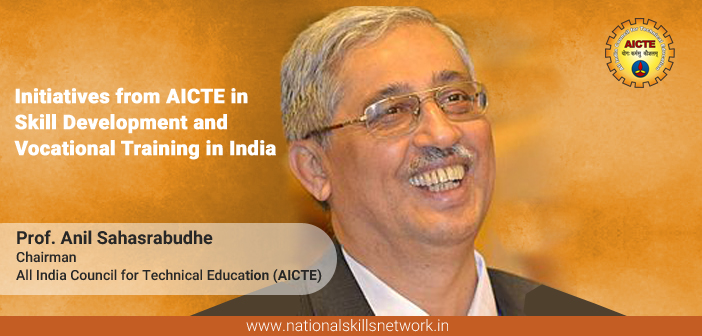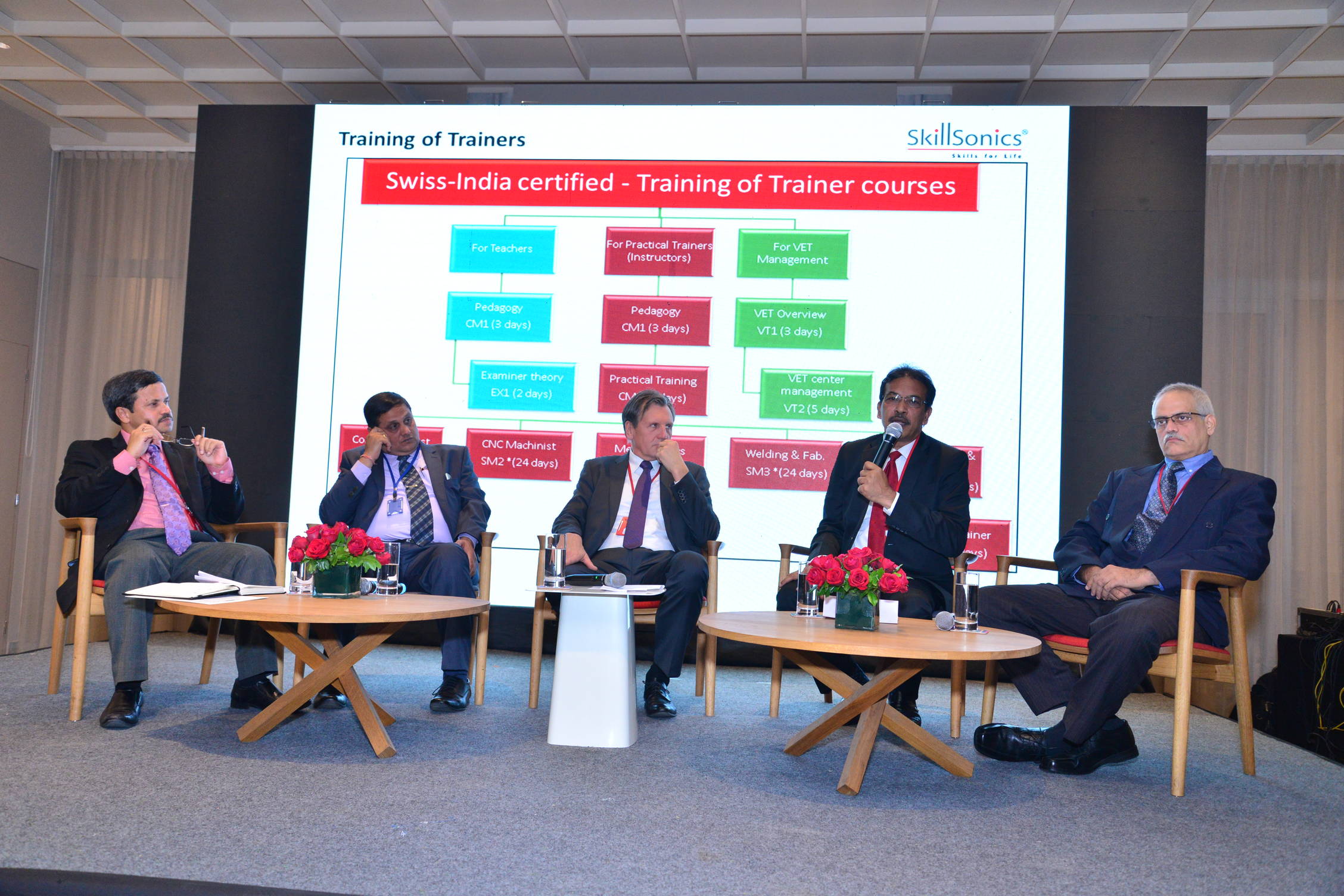Industry-Academia collaboration is crucial to boost employability and entrepreneurship among students. For this purpose, AICTE has embarked on various initiatives that focus on imparting skills and knowledge both for the students and the faculty, partnering with the industry members. This Skill Talk by Professor Anil D. Sahasrabudhe, Chairman, All India Council for Technical Education (AICTE), describes the programs and schemes that connect educational institutions with the industry and to improve both the quality of students and faculty through internships and trainings.
 We have been involved with Pradhan Mantri Kaushal Vikas Yojana (PMKVY) for the last two years. And prior to that, we have been engaged with linking students with employability as well as skill development. We have had a variety of programmes to help improve student employability. One of them focused on enhancing the employability of students by giving them additional training. For instance, the Employment Enhancement Training Programme jointly conducted with BSNL, has helped them in learning about latest digital exchanges and how electronic communication technologies work. Earlier, through placement, a student with B.E. /BTech in Electronics, would normally get Rs.3 Lakhs package, but students who had undergone this course for over 2 years, could get an enhanced package upto Rs. 6-7 Lakhs. The course was held during weekends and the students were taken to a digital exchange to give them on job training.
We have been involved with Pradhan Mantri Kaushal Vikas Yojana (PMKVY) for the last two years. And prior to that, we have been engaged with linking students with employability as well as skill development. We have had a variety of programmes to help improve student employability. One of them focused on enhancing the employability of students by giving them additional training. For instance, the Employment Enhancement Training Programme jointly conducted with BSNL, has helped them in learning about latest digital exchanges and how electronic communication technologies work. Earlier, through placement, a student with B.E. /BTech in Electronics, would normally get Rs.3 Lakhs package, but students who had undergone this course for over 2 years, could get an enhanced package upto Rs. 6-7 Lakhs. The course was held during weekends and the students were taken to a digital exchange to give them on job training.
There are also initiatives to get people from technical training domain to join as skill knowledge providers in the colleges. And, under the National Employment Enhancement Mission (NEEM), we facilitate hands-on learning experience by connecting students with the industry in apprenticeship model.

Community Colleges
Today, we support about 74 community polytechnics for offering vocational diploma courses. These colleges were selected out of 200 polytechnics and they received Rs 2 crores to set up the infrastructure and to provide practical employability-linked training. We have found that employability has increased in case of these vocational or community polytechnics compared to other normal polytechnics.
The community polytechnics can offer vocational diploma program or formal diploma program. They can choose any of the sector skill domains and offer the students certification at levels 3, 4 and 5, in these domains as per NSQF and SAMVAYA framework, students are eligible for getting diploma in vocation. This informal option of Vocational Diploma could be completed in 3-4 years by working professionals as per availability of time.
Pradhan Mantri Kaushal Vikas Yojana (PMKVY)
For implementing PMKVY, we encourage colleges to use their existing facilities in the evening hours. The students undergo skill training program of about 250 hours. It is remunerative to the colleges since they get a fund of around Rs.8000 per student. They can utilize this fund for purchasing tools or equipment to augment the existing resources for training of students or for paying remuneration to the external or internal training faculty, training of faculty, conducting examination of students through sector skill council.
At the end of the course, the students are examined and certified as per NSQF levels. However, the exam cannot be conducted by the college; they need an external agency and this role is normally fulfilled by people in the industry, or to be precise, the Sector Skill Councils. Through this program, we are effectively using existing infrastructure, augmenting them, and increasing employability- mainly for school dropouts.
In the first year, 1200 colleges had applied and we selected around 1000 of them. They could skill 25 to 100 students in different skills. Since the emphasis is on one-to-one interaction, too many students cannot be taken in one class. There could be 4 divisions, training 4 different skills for each division of 25 students– for example, technician in air conditioning, automotive, refrigeration, etc., There could also be same skill training given for multiple divisions. It all depends on infrastructure available, capacity, interest of students, availability of industry and opportunities for immediate employability of skilled students.
Industry- Academia Collaboration
We have a long-term plan for industry interaction, which started about 6 years ago. An award for “Best Industry-Institute Interaction” was instituted jointly by AICTE and Confederation of Indian Industry (CII). This has grown from strength to strength over these years increasing the number of categories and disciplines. We engage with institutions and ask about their industry interaction through a well designed format. Based on initial screening, list of institutes are shortlisted and visits are conducted to verify the information provided by institutes before announcing the awards.
We are also working on updating the curriculum. Our curriculum is outdated, so we involved professors from IITs and industry members to completely revise the curricula, so that what is needed in the industry is being taught in the colleges.
Adjunct Faculty Scheme
AICTE has come up with the scheme of adjunct faculty scheme under which colleges can invite people from industries to take classes in engineering colleges and polytechnics. They are called adjunct faculty. They need not have higher degrees like M. Tech or Ph.D; they may have only bachelor’s degree but should have spent at least 10-15 years in industry. They can come and provide industry perspective to every course. They may take a full industry relevant course or complement a part of the course by bringing industrial relevance based on his/her hands on practical knowledge to the classroom. The students will thus get a sound theoretical knowledge as well as practical knowledge and thus become industry ready. Thus this will be a win-win situation to both college and the industry.
Promotion Scheme of Faculty
Earlier, for promotion from one level to the other level, every faculty member had to undergo a minimum of 6 weeks of faculty development program. If one is a teacher of Computer Science, he or she had to be aware of the latest developments in the field. Such courses are arranged by top-notch institutions- like IITs, IISC Bangalore, and even some good universities. Faculty members had to attend these courses and complete courses up to 6 weeks, and be eligible for a promotion. Whereas now, we have mandated that out of these 6 weeks, at least 2 weeks should be spent in the industry. This will ensure that a faculty will undertake industrial internship for every next level of promotion.
Industry Internship
Industry internship has been made mandatory for all students and if not for one entire semester, at least for two 2-month summer vacations. The industry engages students by providing hands on work experience and industry exposure during internship, faculty gets involved, students get short-term industry-oriented projects, and so on. This way the skill set of students start improving in terms of applicability, problem-solving ability, team work, time management, communication skills, etc. Students learn from the stage of identifying a problem to providing solutions and optimising them. These are the traits industry looks for in candidates, and indirectly through all these trainings, students will inculcate these traits.
Learning from the industry need not just be from large-scale industries. Students learn far better in small industries because they will go through all the departments of the company being a small unit rather than a large company where one may be restricted to one or two divisions of the company. For that matter, startups may be even better. Students will understand the nuances much better in a smaller organisations. We have signed MoUs with several startups for providing internship opportunities to students. We have also signed MOUs with MSME and MSDE for providing internships to our M.Tech students. Our target is to reach 75% students doing internship in the next one to two years and then 100% for the next batches.
Apprenticeship and Entrepreneurship
We also support apprenticeships. After graduation or diploma has been completed, students are encouraged to enroll for apprenticeship, with a stipend, This helps them become more employable. We want students to be entrepreneurs too. Hence AICTE start up policy permits courses in innovation, idea generation, entrepreneurship, business management, finance, apart form regular engineering courses. In addition, if a college can have an incubator, then training, handholding, mentoring for creating startups is possible through all years of study. If they learn things well, instead of taking up jobs they will be able to provide jobs.
Other initiatives from AICTE
- Mentorship program: We have seen that for post-graduation and research, IITs and NITs get students from colleges and institutions other than their own. Hence it is in the interest of IITs and NITs to handhold nearby institutions and improve the overall quality of these institutions thereby create a good quality students feederline for their own PG and Research programs. We are funding them for this scheme, which will help them in improving the overall improvement in quality of technical education and in turn get good students for postgraduate and research programs.
- Unnat Bharat Abhiyaan: We want institutions to adopt villages and ask students to learn problem solving ability while visiting these villages. This will improve their problem solving skills, as they get real life exposure of problems and also help rural India.
- Faculty Training programme: It is mandatory for every faculty member to go through this pedagogy based teacher induction program. Fresh teachers have to go through this as well to become regular staff. New pedagogy and teaching learning processes are made familiar to the faculty during this one semester long program.
- Student Induction Program: This is a 3 week duration program for 1st year students. It is a program for creating level-playing field for students from different backgrounds, to befriend each other through games, sports, humanities, arts, crafts, film screenings, picnics, etc. A group of 25 students and 1 faculty will form every group. Bonding between faculty and students, and bonding among students, is encouraged during this program. It is a good way to avoid ragging and make students know each other better.
- Smart India Hackathon: A hackathon was conducted for students of technical colleges, by giving them challenging problem statements and asking them to find digital solutions and mobile applications and help the Govt and public and make their life easy. This year we will also conduct hardware hackathon. Students will create new and innovative products- which will help the society and people.
The closure of engineering colleges has been in the news because they are unable to fill in the seats. We asked these colleges to close down and start providing skill development courses utilizing the existing infrastructure and machinery. Non-performing colleges, where quality is low, need to be shut down as we do not want to produce students who are not competent in their field.






Dear sir/mam,
i just wanna ask that ho can i start course can u please send me the link by mail of different courses. so that it will be easy for me to find the better course for me.
thank you